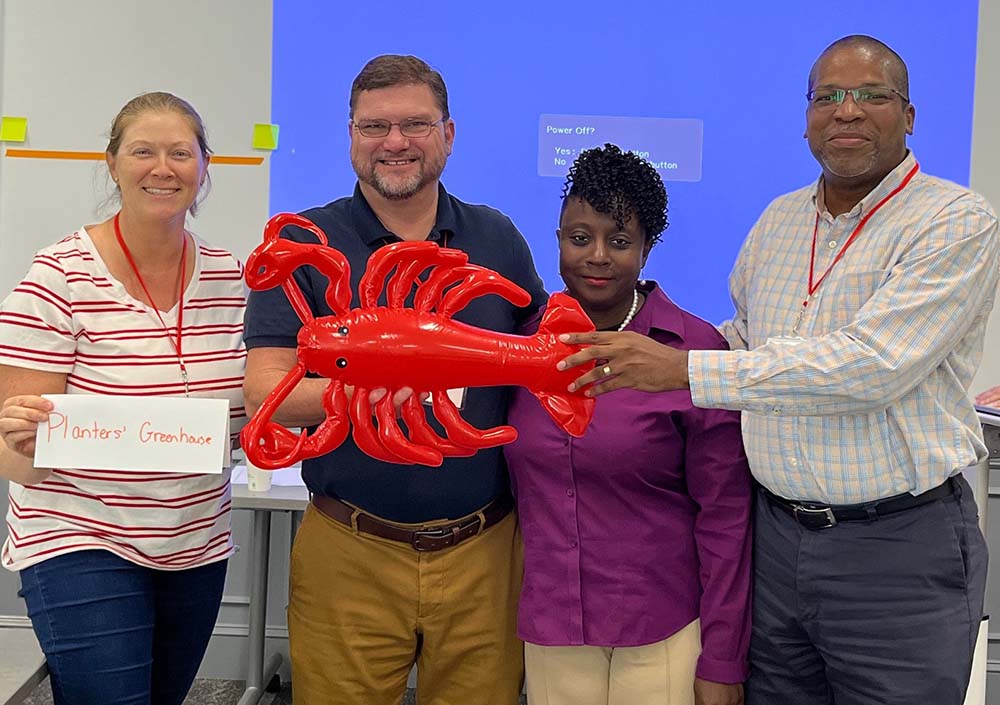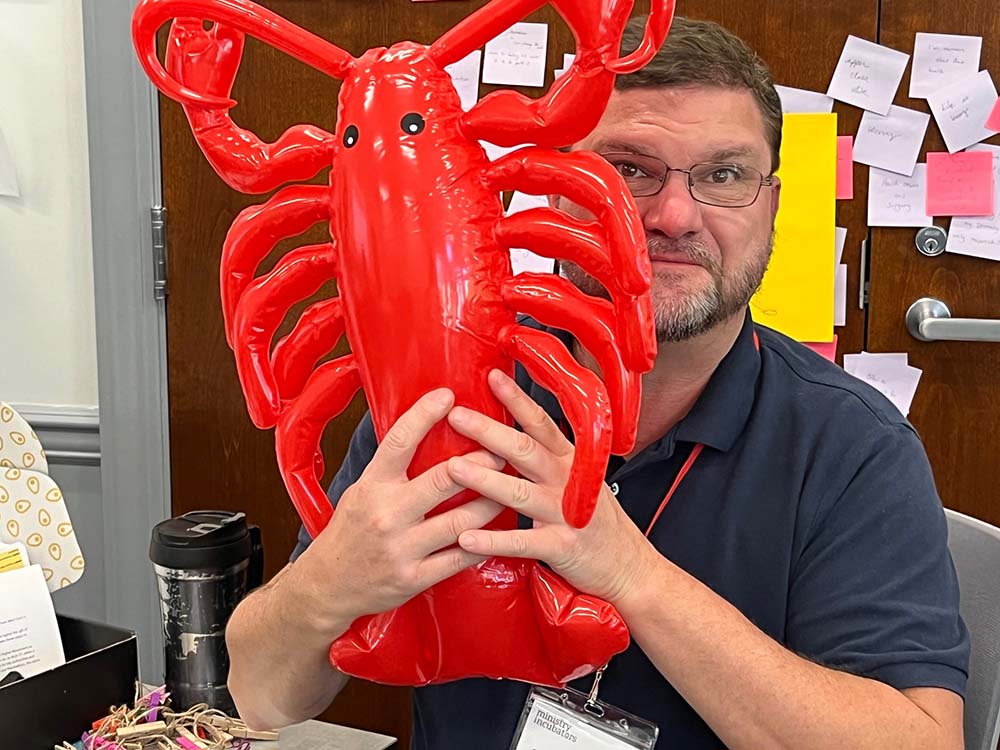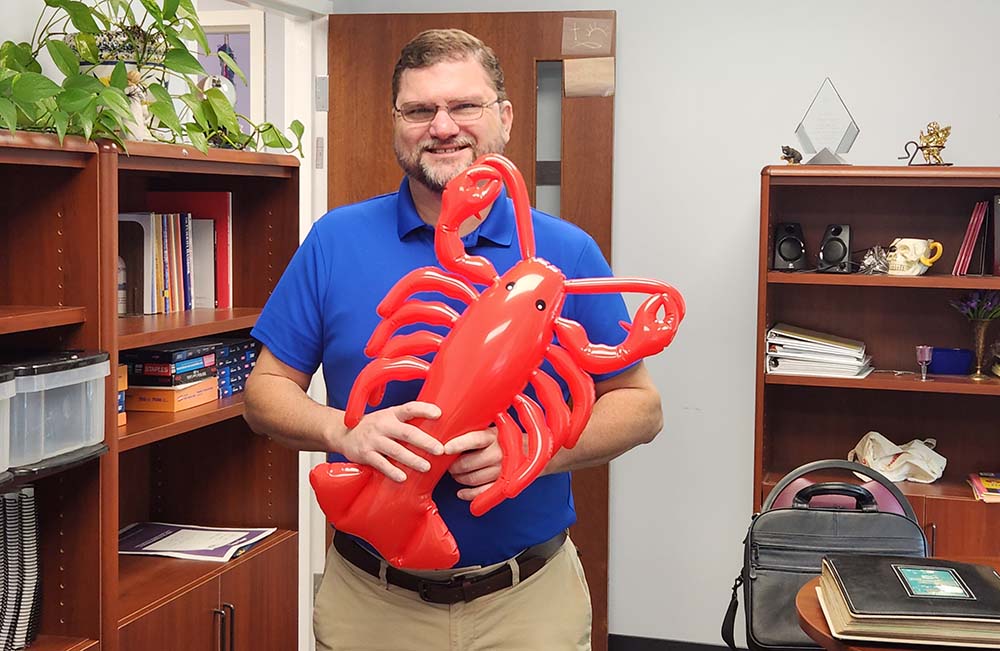Dwayne Stinson and his lobster.
By Dwayne Stinson, Associate Director of Influencing Ministries
There’s a lobster in my office. He’s red, about two feet long, with large pinched claws and oh, by the way, he’s inflatable.
I got him last week at the Hatchathon which the Western North Carolina Conference sponsored. A Hatchathon is a two-day retreat where ministry innovators come to incubate new ideas. The organizers said to bring the napkin you wrote your idea on, and they help you develop it into a plan. The event aims to “put wind in the sails of ideas that people say will never work.” The Rev. Mark DeVries and the Rev. Dr. Kenda Creasy Dean of Ministry Incubators led our time together.
At one point during the event, each team received a lobster.
As lobsters grow, they must periodically shed their current shell to accommodate their larger bodies. The lobster has all the resources it needs to form the new shell. It starts by withdrawing nutrients from the old shell, and slowly grows bloated with water that separates the lobster’s body from its shell, and which eventually cracks the shell. Then the lobster must slowly withdraw its eyes, claws, and legs from the old shell, and squeeze its body backwards out through the opening. It finally pushes itself out of the last bit of shell with its tail. The lobster is most vulnerable at this point. Even as it pumps nutrients through its body, it takes several days for the new shell to harden, but once it does, the lobster has room to grow again.
Imagine the lobster as a metaphor for the church, trapped in a shell (you pick what that shell represents!), unable to grow, perhaps bloated because it’s pulling all its resources inward. It is not until the church takes the vulnerable step to leave that shell, to risk exposure to the outside environment without the protection of bricks and stained glass, that it is able to grow again.

The Hatchathon was full of images -– ”colliding turtles” (when two people with ideas encounter each other), “desperation as a spiritual gift,” even Utz Crab Chips (“a different flavored dust on the same old thing”). Yet the image of the lobster is what floated to the surface for me, not just because he’s on the shelf behind me. The lobster has lessons to teach. Among them,
- The church has been “tweaking ourselves to death instead of rethinking the fundamental way we do and be church.” Updating worn out models of ministry is not the way to make disciples for Jesus Christ. We are people of grace, who believe in the sanctifying work of the Holy Spirit to transform all who encounter Christ. To be transformational, the church must innovate.
Kenda Creasy Dean builds on Gordon MacKenzie’s work to create a continuum of innovation.
Imitation → Improvement → Evolution → Disruption → Transformation
Imitation is the least value-added form of innovation. Next comes improvement, then evolution, then disruption. The final most valuable form of innovation is transformation (See Kenda Creasy Dean, Innovating for Love: Joining God’s Expedition through Christian Social Innovation, 79). Only God creates transformation; we must move to where God is already working.
- “God does not call us to have great ideas. God calls us to have great love.” Kenda shared that Christian innovation begins, not with “why,” but with who -–who is God calling us to love right now? Our ideas and reasons all derive from this “who.” That’s the model Jesus set–encounter a person, understand their gifts and needs, and then minister to and with them.
- “‘You don’t have to look for ministry. God will give you ministry. You just have to look around’” (Kenda Creasy Dean, quoting someone whose name I didn’t catch).

Locked in our lobster shells, as beautiful as they are, the church gets stunted. There are people all around us who do not know the gift and challenge of a relationship with Jesus. The church must poke its head out of the doors and windows and notice these folks. Otherwise, we may just get stuck in our shells and, like a poor stuck lobster, shrivel away.
This Hatchathon reminded me that the church is not here to innovate for innovation’s sake.We are here because of our relationship with a God who dies and rises from death, a God who is moving and acting in the world. The resurrected Jesus calls us to follow him into the world to be in ministry there too, which means bursting out of the patterns of ministry that confine us, and encountering Christ who is already working outside our walls. So get cracking at those shells… your glorious lobster future awaits
.

